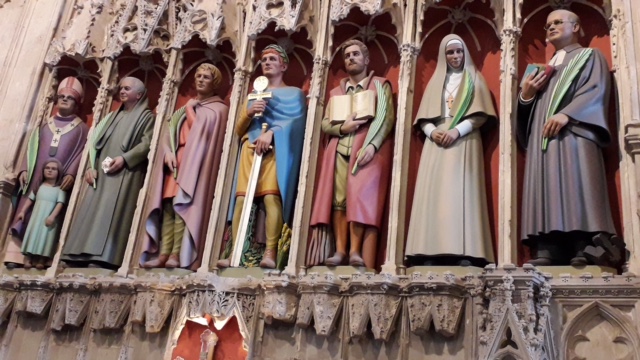The Pope's visit to Iraq underlines why martyrs still matter

The history-making visit by Pope Francis to Iraq over the weekend made headlines around the world.
It was the Pope's first overseas visit since the start of the pandemic more than a year ago, and the first ever papal visit to the country.
While in Iraq, he declared: "Let us remember our brothers and sisters who have paid the extreme price for their fidelity to the Lord.
"May their sacrifice inspire us to renew our trust in the strength of the Cross and its saving message of forgiveness, reconciliation and rebirth."
The visit came against a background of many thousands of Christians being persecuted or killed for their faith in Iraq, and many of the nation's Christian believers fleeing abroad.
One of the world's oldest Christian communities has seen its numbers plummet over the last 20 years from 1.4 million to about 250,000, less than one per cent of the country's population.
The historic visit also underlined the enduring role of martyrdom in the story of the Christian faith. It comes shortly after the publication of 'Martyrdom – Why Martyrs Still Matter,' (SPCK) a newly-published study of the significance of martyrdom by commentor and writer on religious affairs, Catherine Pepinster.
The book is published as growing numbers of Christians around the world are facing persecution and, in some cases death, for their faith. Ahead of his visit to Iraq. Pope Francis said on Twitter: "My dear Christian brothers and sisters from Iraq, who have testified to your faith in Jesus amid harsh sufferings: I cannot wait to see you. I am honoured to encounter a Church of martyrs: thank you for your witness!"
Pepinster, who edited the Catholic weekly, The Tablet, for 13 years, traces martyrdom from the Early Church, beginning with Stephen, the first Christian martyr, through the Reformation, the 20th century – 'a totalitarian, godless age' – to today where the scale of the persecution of Christians is becoming more widely recognised.
Open Doors, a non-governmental organisation supporting the persecuted church around the world, estimates that more than 4,700 Christians were killed for faith-related reasons last year. North Korea, Afghanistan and Somalia top their list of the most dangerous places to profess the Christian faith.
Open Doors places Iraq at No.11 in their 'World Watch List' of 50 countries where Christians face the most extreme persecution. It states: "Persecution faced in public and private life has not changed significantly, but the level of violence faced by Christians has increased sharply in the past year – which is largely the reason that Iraq has gone from no.15 to no.11 in the World Watch List. This is due to more reports of Christians being attacked or killed and churches being attacked."
Pepinster points out the role that martyrs play in the devotional lives of many Christians, and also their appeal to the wider culture.
In St Albans, Hertfordshire, where I live and minister just north of London, the city is named after Alban, Britain's first Christian martyr. Each June, St Albans Cathedral celebrates the Saint's day with a colourful procession and special services. In 2017, the cathedral opened a new £7 million visitor centre, aimed at increasing understanding of Alban's significance in the story of the British church.
The cathedral has also added a prominent display of seven martyrs, three on either side of Alban in its nave screen. These include 20th century martyrs such as Elizabeth Romanova, murdered by the Bolsheviks in 1918, Dietrich Bonhoeffer, who was executed by the Nazis in 1945, and Oscar Romero, who was killed in El Salvador in 1980.
St Albans Cathedral, in pre-Covid days, was attracting increasing numbers of visitors, drawn by the story of Alban and his martyrdom. It's my expectation that visitor numbers will return and grow in the coming years, with many people making a 'pilgrimage' to the city.
Pepinster describes St Albans and other places associated with martyrs as providing "a thin veil between this earth and the next."
In her comprehensive 273-page exploration of martyrdom, she reviews changing perceptions of martyrdom, and concludes that martyrs have an important and continuing role in the faith practiced by many Christians today.
She writes: "There is a vividness and integrity about these individuals that attracts people, and there is a constancy in how attractive these are.
"What do we want from martyrs? We want their ordinariness, as a reminder that it is possible for the rest of us to become extraordinary. We want a sense that the divine is among us; or even if we are not believers, a sense that there are people who live lives faithful to what is right.
"Martyrs will continue to be part of the vast panoply of human beings and their lives and deaths will continue to matter."
I say Amen to that. Wherever Christians face persecution and death for their faith, their witness is a challenge and encouragement to our own faith, and a call for us to support Christians facing persecution wherever that occurs.
Peter Crumpler is a Church of England priest in St Albans, Herts, a former communications director for the CofE and the author of 'Responding to Post-truth' (Grove Books).











